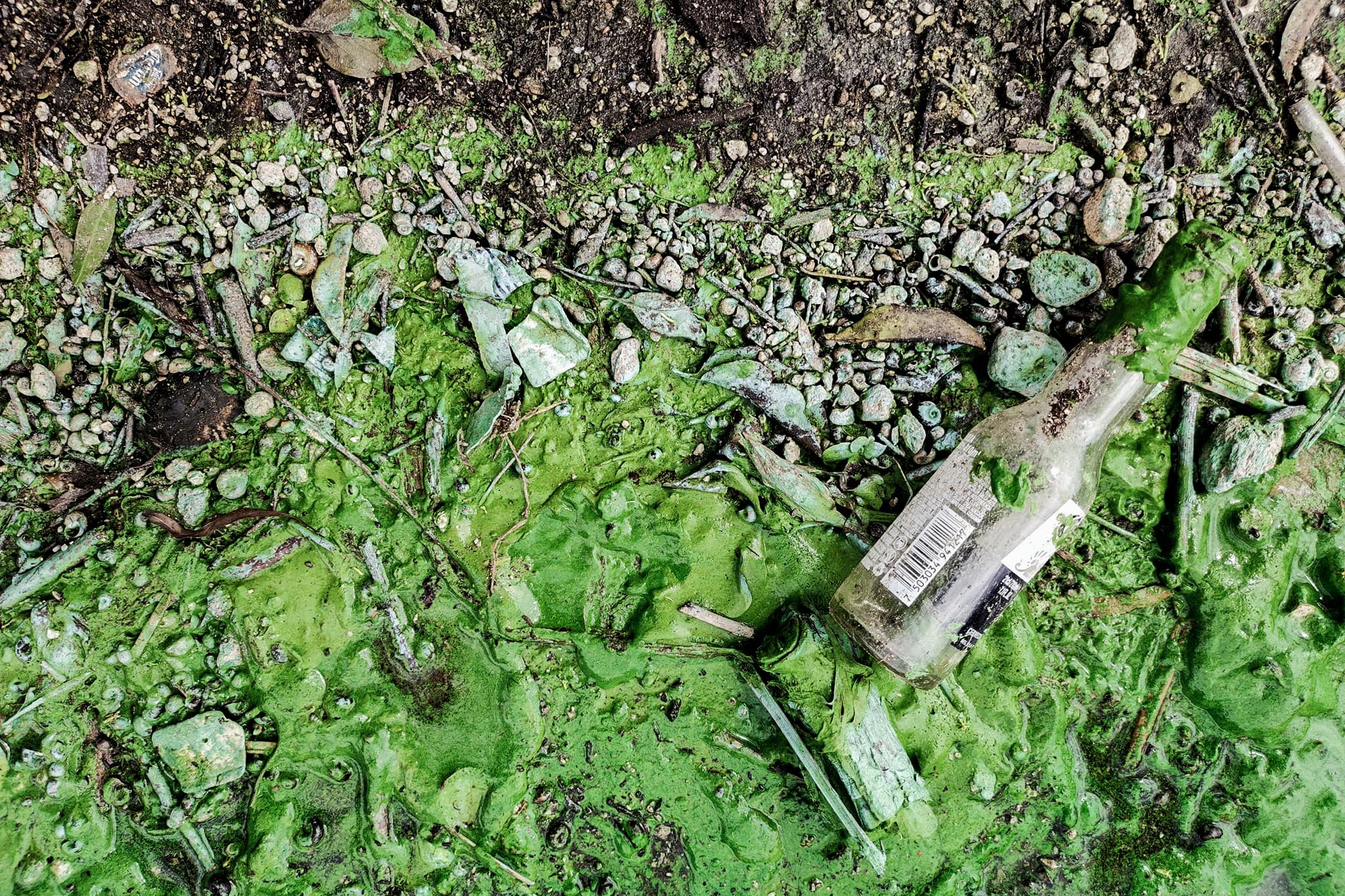Circular economy, the key to the rescue of Lake Amatitlan
in 2019, the former vice president of Guatemala, Roxana Baldetti, was sentenced to 15 years in prison for the “Agua Mágica” case, which was supposed to help decontaminate Lake Amatitlan.
Tired of the lack of definitive solutions, several residents of the lake basin have decided to act in search of solutions based on concepts of sustainability and circular economy.
In recent months, on social media and in some streets of Guatemala City, a campaign has been circulating that, to say the least, attracts attention, not so much for its originality, but for its protagonist: Lake Amatitlán. Baptized as “Amatitlán: The return 2032”, what is striking about this is that it is focused on the clearest case that Guatemala is betting very little on the correct treatment of its waste, and the consequences that this has on natural ecosystems.
This campaign is carried out by the Nueva Narrativa (New Narrative) movement, who, together with neighbors from the lake basin, met earlier this year to put into perspective what is needed to restore the health of this body of water, as well as the tools that are currently available to achieve it. From then on, the Locos X Amati (Crazy for Amati, short for the lake’s name) initiative emerged, led by local resident Manolo Ralda.
Since then, this initiative, made up of more than 80 people wishing to generate change, has already managed to organize itself into commissions, with the idea of intervening in legal, social, environmental management and land use issues, as well as other matters of interest for the management of the Amatitlán basin.
In May, they managed to gather a good number of residents and other volunteers from the country to carry out a reforestation campaign in the Playa de Oro Municipal Park, where one thousand trees were planted. Unfortunately, they drowned due to an unusual flooding of the lake.
But, despite these adversities, the initiative is convinced that this is the way forward, and they are aware, according to Ralda, that they must overcome many challenges in order to change the perception about the state of conservation of the lake and its destiny. This is not the first time that initiatives have arisen to solve the contamination problem of Lake Amatitlán, possibly the second most polluted body of water in Guatemala, after Motagua.
With what has been experienced during the COVID-19 pandemic that is still in force, there are many people convinced that a radical change in habits is necessary, in which community participation, obtaining new skills and protecting the environment are the values that promote the development of the human race.
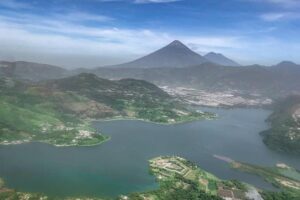
Lake Amatitlán receives solid, organic and industrial waste discharges from 14 municipalities in central Guatemala, inhabited by more than 2 million people. Photo: Jorge Rodriguez/Viatori
Resilience and mitigation
“Since the pandemic, we began to get involved in the creation of urban gardens and we began to create awareness of taking advantage of the organic waste that we produce at home to create our own organic fertilizer. So, we reached about 700 families,” said Marixa Contreras, founder of the Altruistas Good initiative, made up of 10 women residents of the municipality of Villa Nueva, one of four that border the lake.
She took advantage of these visits to motivate more women to become part of her initiative, and thus be able to acquire new skills that would benefit her livelihood. “We invite women to cultivate and we have already expanded our variety to 10 different types of vegetables. This has allowed us to create our own seed bank,” she said.
On the other side of the lake, in the village of Llano de Ánimas, on the shores of the lake, and inspired by her mother’s teachings, Lucy Sandoval decided it was time to take action for the benefit of Amatitlán. “My mom taught us to select all organic and inorganic waste. So, all the waste from the kitchen, from the vegetables and fruits, she used for the garden, ”she said.
With this in mind, and thanks to the support of her husband, an agricultural engineer, she took on the task of creating a seed bank and teaching the women of her community to have family gardens in their homes, in order to improve their livelihoods. economic situation and their nutritional health.
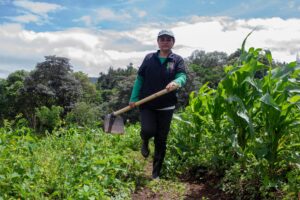
Marixa Contreras leads the Altruistas Good movement, which encourages the women of Villa Canales to acquire new skills to empower themselves and be able to get ahead. Photo: Jorge Rodriguez/Viatori
On a visit to Europe, he was able to experience first-hand the efforts being made in some countries of the Old Continent to prevent the proliferation of plastic waste. “I was able to see the machines where you can put your bottles in and receive money and tickets to redeem for products,” she said. That gave him the idea of implementing a similar program in Guatemala, an eco-store based on the circular economy concept in which everything that can be reused is reused, and which he baptized the Eco-Luciérnaga (Eco-Firefly) Store.
“What we do is that people bring us their recycling, that is, books, paper, cans, PET, glass bottles, and we buy them with a slightly higher market value, so that they leave motivated and do it again. ”, he counted. Over the last two years, Sandoval has collected up to 20,000 plastic bottles and some 3,500 pounds of paper, which are put to new use. “We exchange recyclable products for points, and thus the collectors, or anyone who leaves us material, can exchange these points for groceries or other products that we have in the store,” he added.
Both women are convinced that the only way to reverse the situation is to dedicate efforts to environmental education issues, since it is through knowledge that the rest of the population will learn to appreciate more the environmental gravity with which they live, as well as well as to value the efforts that these initiatives make to implement sustainable solutions.
In search of sustainability
While good intentions are necessary to undertake a paradigm shift, none of this can have real impact without achieving economic sustainability. All this without counting the number of adversities that arise along the way. “They tell me ‘this is not Europe, it’s Guatemala, and none of that works here,” Sandoval lamented.
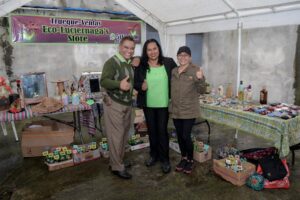
Lucy Sandoval (center) works for the reuse of books and other materials, to create a circular culture of consumption. Photo: Fireflies Eco-Store
Another factor against it is the machismo of society, since women are seen as people with few skills and leadership to generate a significant change in society. “Our project was born from seeing the injustices that women experience within their homes, where their husbands relegate them to domestic activities, and also because of the discrimination of our authorities who do not support us,” added Contreras.
But, more than stopping them, they are determined to follow their dreams, not only to restore the brightness of the lake, but also to provide new tools to the inhabitants of their communities. In the case of Sandoval, although he has been trained in places like Sacramento, California, Paris, France and Amsterdam, Holland, he continues to establish his proposal, with the aim of finding allies that allow him to expand his idea and take it beyond his village. in Amatitlan.
“My dad helps me pick up the produce. A sister helps me with the payment of the premises, another with groceries. We all do a little to make it all work. We have no help from any private company, much less the government. We do it alone,” she said.
Contreras, for his part, has managed to advance a little more, due to the fact that more people are involved in the project. Her group of Altruists has grown to 10 women who actively participate in training, planting and harvesting crops, and making food products. In the last three years, with the production of the orchards, and the elaboration of organic food products, they have already generated some Q30,000 ($3,880) and impacted 1,500 families.
This has been thanks to training programs given by initiatives such as Wonder Woman Guatemala, who provided them with tools to help them be “financially autonomous, be able to develop their business models and move from an entrepreneurial mindset to a businesswoman, to, at some point, to be able to generate jobs,” said Andrea Cabrera, founder of the organization.
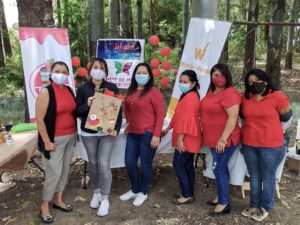
The acquisition of tools and knowledge is key to going from being entrepreneurs to thinking like businesswomen. Photo: Altruistas Good
The empowerment of women in rural areas is key, according to the Sustainable Development Goals (SDG) promoted by the United Nations. “They are intrinsically linked to the lives of women and girls around the world, including rural women, who are essential to their success. In particular, the goal of achieving gender equality and empowering all women and girls, eradicating poverty in all its forms, the goal of ending hunger, achieving food security, and promoting sustainable agriculture, among others ”.
The road for Contreras and Sandoval has not been easy, but both are convinced that the goal of rescuing the lake through environmentally responsible processes is possible. “We want to leave a healthy planet, but we also want to leave healthy people to take care of the planet,” Contreras said.
For his part, Sandoval knows that, although the road is difficult, “if it takes 20 years, it doesn’t matter, because as long as I’m alive, I’m going to do this,” he concluded.
